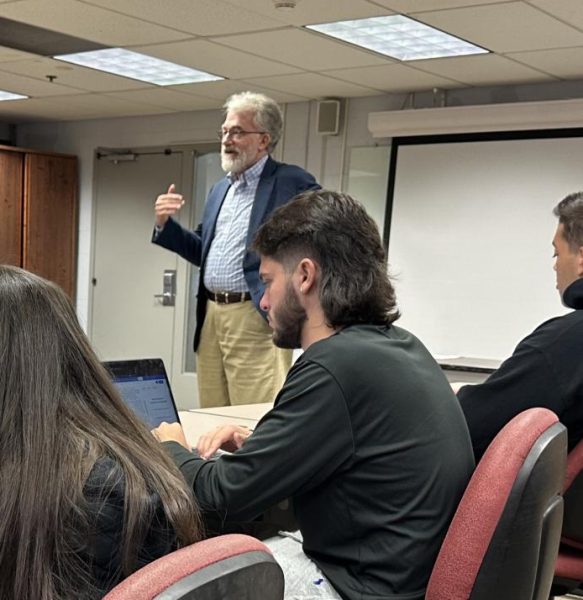A New York Times editor encouraged student journalists at William Paterson to adapt to the changing media landscape by becoming passionate storytellers in specialized fields during a recent campus visit.

Christopher Mele, the weekend deputy editor for the express team, told a news writing class on Thursday, Nov. 14, that the erosion of local newsrooms has fundamentally changed how young journalists enter the field.
“We’re moving away from being jacks of all trades,” he said. “There’s value in having specialized knowledge that’s an inch wide but a mile deep, rather than the traditional approach of knowing a little about everything.”
Speaking in Dr. Hirshon’s COMM 2500 course in Hamilton Hall, Mele noted a significant shift from generalist reporters to specialists.
“Figure out what lane you’re in,” he advised the audience. “Maybe it’s broadcast, maybe it’s print, maybe it’s magazine writing. Then determine what really drives your interest, whether that’s food, breaking news, sports, or entertainment coverage.”
Mele started his career in 1986 as a reporter for the Adirondack Daily Express before stops at the Plattsburgh Press-Republican in Lake Placid, the Times Herald-Record in Middletown, N.Y., and the Journal News in Rockland County. He spent five years as executive editor of the Pocono Record before joining the Times as a staff editor on the metro desk in 2014.
Mele acknowledged the traditional “steppingstones” he made from small to larger newspapers have largely disappeared as the industry consolidates. He said the Times Herald-Record once had a robust newsroom of 130 journalists but has dwindled to a single reporter.
But Mele emphasized that opportunities still exist. The Times has replaced traditional internships with fellowships, offering year-long positions where young journalists work as full-fledged reporters or editors. Success in these programs, Mele stressed, depends more on attitude than experience.
“If you’re green but have passion and enthusiasm for the job, and you’re willing to learn, I can take over the world with that,” he said. “I’ve worked with 20-year veterans who just didn’t give a crap, and there wasn’t enough dynamite in the world to get them to cover a story.”
The Times’ fellowship program provides hands-on experience in high-stakes journalism. Fellows work weekend shifts from 4 p.m. to 11 p.m., gaining valuable experience in breaking news coverage. “You have to earn your stripes,” Mele said. “You’re going to have to be in the trenches for a while before you work your way up.”
Beyond traditional news outlets, Mele highlighted opportunities in specialized publications. “Whatever topic you can imagine, there’s a publication that covers it – toys, video games, architecture, real estate, medicine, science,” he said. “Your writing and reporting skills can be valuable in any of these niches.”
At the Times, Mele supervises breaking news coverage of major events from mass shootings to natural disasters during intense 12-hour weekend shifts. He characterized his weekend team as first-responders to breaking stories that generate nationwide news alerts. “We’re kind of like the Marines,” he explained. “We go in and hold down the territory while reinforcements come in.”
The role of the weekend desk has expanded to identifying trending topics and producing features. Mele shared examples of recent stories his team had published, including an investigation into dangerous staircases and his own piece that provided practical safety tips for people attacked by moose.
“Sometimes it’s the quirky stories that really capture readers’ interest,” Mele said, recounting how an article about the number of French fries a person should eat “went completely hog wild” after a Harvard professor suggested limiting intake to just six.
For young journalists seeking to enter the field, Mele emphasized the importance of humility and curiosity. “There are no stupid questions,” he said, describing his approach to mentoring fellows on his team. “You learn more from your mistakes than your successes. That’s part of the proving ground.”
He pointed to People Magazine and TMZ as examples of outlets that have carved out successful niches in areas like true crime coverage and celebrity news. “They actually do a pretty good job,” Mele said. “TMZ, God bless them, I don’t know how they have their sources, but they’re always ahead of the headlines.”
Mele said the value of journalistic skills extends beyond media organizations. Corporate communications, universities, and healthcare institutions increasingly seek professionals who can produce content quickly and effectively. “People are in awe of what we do,” Mele said. “The ability to report and write something on deadline seems like magic to most people.”
Mele’s message to students was clear: success in modern journalism requires adaptability, specialization, and an unwavering commitment to learning.
“The whole point of being in journalism is to ask questions,” Mele concluded. “If you’re a know-it-all, you don’t belong in a newsroom.”
Bartolome • Dec 7, 2024 at 9:02 pm
Great Report !!